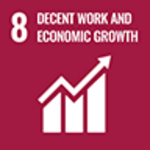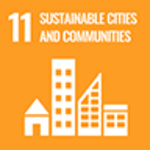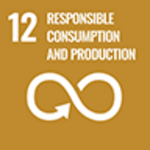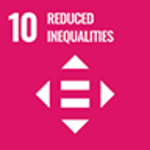
The food exchange event “Hokkaido University Marche”, which has been run mainly by Hokkaido University students, will be relaunched in 2021 as “Hokkaido University Marche Awards”. The final screening was held on November 13th, seeking applicants who are involved in agriculture, rural areas, and food activities with an eye on the future. There are a total of 9 finalists. Each participant gave a 10-minute presentation on either the agricultural, rural, or food categories, and after discussion among 11 judges, including students, the top prize was awarded to the Sorachi Minami Sweet Potato Club.

Grand Prize winner “Sorachi Minami Sweet Potato Club”
The Hokkaido University Marshare Award Executive Committee is made up of 17 master's students from the Hokkaido University Graduate Graduate School of Agriculture and Graduate School of Global Food Resources. Mr. Naoto Suda (Graduate School of Global Food Resources), Executive Vice-Chairman, Mr. Ryoma Honda (Graduate School of Agriculture), and Mr. Li Shu (Graduate School of Global Food Resources), who served as the moderator of the final screening, received the award for the first year. We asked them to look back on their activities.
A popular project returns to its roots. Spotlight on unknown agricultural and food activities
The Hokkaido University Marche, which is held every summer, is a popular event for Sapporo citizens where attractive producers from all over Hokkaido gather. Please tell us how it was reborn as the "Hokkaido University Marucha Award".
Lee: Hokkaido University Marche is a project that began in 2010 as part of the graduate school common course subject ``Fundamentals of Food Safety and Security IV'' taught by Professor Kuniyuki Kobayashi and Professor Tomohiro Mitani. We were very proud that the event has grown into a popular event that attracts many people every year since the days of our seniors, but Mr. Kobayashi and Mr. Mitani also wanted to ``go back to our roots once again.'' It was reborn as an award project.
In addition to introducing delicious agricultural products and famous processed products as usual, we would like to spotlight people who are engaged in agriculture and food activities with an eye to the future. We want this to be a place where people can get to know not only producers, but also rural communities and a wide range of people working to solve various food issues. This is the origin of the new Hokkaido University Marucha Award.
Suda: We have prepared three application categories: ``Agriculture Category,'' ``Rural Category,'' and ``Food Category.'' First, we created a homepage and disseminated information on various SNS to let people know about the fledgling award event. Information was disseminated by sending individual emails to people involved in agriculture known to members of the executive committee.
Honda: What we particularly valued was ``discovering'' people who are not well known yet, but who are continuing to do important work in the future. Since most of the applicants were small to medium-sized family businesses, we assigned a student to be in charge of each applicant, and at times we supported them through their presentations on the day of the screening, while also conveying our thoughts from a student's perspective.

During the presentation by Utopia Agriculture in Hidaka Town, Mr. Honda was impressed, saying, ``Hidaka Town's Utopia Agriculture is passionate about their pursuit of futuristic agriculture through luxury goods like cheesecake!''
Lee: One issue we faced in the first year was that there was variation in applications from department to department. Many companies asked us if they would like to apply, and as a result of discussions among the executive committee, we welcomed all 9 groups who applied through document screening as finalists.
When I think about it now, the concept of each category we set up was different from the standard of a typical food contest. For example, in the case of the ``Food Category,'' the content was a little loose, ``conveying food that moves the soul through new discoveries and new experiences,'' which may have made some participants feel difficult to apply.
The people who understood this and applied were happy to say, ``It was fun to work with students. It gave me confidence in our activities.'' We are also grateful for the direction of this Hokkaido University Marche Award. I was able to gain confidence in my sexuality.
A wide variety of products such as “Yukuri Potato”, smart agriculture, food sharing, etc.
The final judging session held at Hokkaido University Marche Lab on November 13, 2021 will be streamed online on the day, and archived videos can also be viewed on the official website. All of the nine finalists' presentations were so amazing that it was difficult to choose one from the other, which caused the judging time to take a long time.
Honda: The selection was not a quantitative one, but rather a discussion between the judges, so it was quite heated.
To give you a quick overview of the results, the ``Food Category Ishokudenshin Award - Food that Moves the Heart~'' was awarded to Utopia Agriculture, which pursues the possibility of ``Cheese Wonder'', and the ``Rural Category Regional Energizing Starter Award''. 》 is DJ Madeline from the radio program “Tokachi Woman Frontier” and Madeline Co., Ltd. The 《Agriculture Award for Talking about the Future》 is awarded to float meal, where a team of current Hokkaido University students takes on the challenge of producing “Daphnia japonica”. , and the Grand Prize went to Sorachi Minami Sweet Potato Club, which united under the new brand ``Yukuri (Yukuri) Imo'' after the merger of JA Yuni Town and JA Kuriyama Town.

Madeline participated via zoom from Hiroo Town. Upon hearing of the award, he expressed his gratitude, saying, ``The students really worked hard to support me before I made my presentation.''
Please tell us about each finalist who particularly impressed you.
Lee: I was in charge of Kihi Togen Farm, a corporation formed by five farmers in Tsubetsu Town. Their fields are located in deep mountain areas, and they are working hard to overcome these disadvantageous conditions by introducing new cultivation techniques and smart agriculture.
What I particularly remember is when I went to interview a male member, he said, ``Women are amazing, aren't they?'' ``Even when the men are complaining about the bad weather or the hard work, the women are always smiling cheerfully, and hearing their laughter makes me feel better,'' she said. It's like one big family. I realized that although there is the power of new technology, it is because there are people who enjoy farming that we can continue to do it forever.
Honda: I was also impressed by Kihi Togen Farm. While aiming to realize sustainable agriculture, I think that these activities also overlapped with the question of ``how to live'' and how to live.
Suda: In the sense that I was able to show the breadth of the finalists, I chose float meal from the Hokkaido University student team and Press Food from the food department, which is developing a subscription-type food sharing service to prevent food waste. People from various directions and different perspectives came together, and the networking session among the finalists was also very lively.
Hokkaido University Marucha Awards would like to value such horizontal connections, and I hope that they will lead to new business models that will become the norm in the future.
Although the winners do not receive any prizes or cash prizes, we are asking them, ``Would you like to continue coming up with new projects together with students?'' along with event sales on the Hokkaido University campus.

Awards ceremony
A place where children in rural areas can see themselves as cool adults
The international goals of SDG17 include references to primary industries such as "14 marine resources" and "15 terrestrial resources," and the spirit of the Hokkaido University Food Award, such as "2 hunger," "9 innovation," "11 cities," and "17 means of implementation." There are many things in common.
Suda: The theme we set this time is "Let's start doing what we take for granted 20 years from now." One thing that all nine groups had in common was that each applicant believed that ``if we do our part, things will get better.''
There are people who are working towards issues that naturally arise in order to sustain their business 20 years from now. I would be happy if everyone who learned about it could use this as an opportunity to think about the future of agriculture and food.
Lee: Needless to say, I think we as students have already covered most of the challenges in agriculture and food for a sustainable society. How can we survive in the face of a lack of successors, a declining population, and a global food system?
Rather than discovering new challenges to the current situation, the purpose of the Hokkaido University Marucha Award is to spread the word about people who are already taking action to solve the problems they face.
It's not just a loud statement like ``To solve problems!'' but a desire that comes from the bottom of our hearts that ``We want to enjoy farming!'' We are moved by this, and we can see how cool it is for others to see. I want to tell people too.
The members of Naganuma Town's Farmer's Bride Project have children ranging in age from elementary school to high school. When I asked them, ``Please bring them to the final screening,'' a large group of them came on the day of the screening, and when I asked them afterward how the mothers' presentations went, they said, ``It was really interesting!''
Even if the children who were at that venue grew up and did not become successors in agriculture, if they saw the adults presenting there and had a positive image of agriculture and rural villages, they would surely have a strong future. I'm sure you'll be a supporter. I believe that the final screening meeting led to such future possibilities.

The ``Farmer's Bride Project'' introduces the origins of the movement through a skit. She supports women's energy by having fun without trying too hard.
Honda: I usually stay in my lab and do research, so I was able to interview active farmers through the Hokkaido University Marushare Award, and I was able to have time to talk with students who have different values. I learned a lot.
I think that the fact that these activities are included in common graduate school courses is a characteristic of Hokkaido University, which values practical learning. If you are interested in "Fundamentals of Food Safety and Security IV," please check it out. Although the amount of activity is incomparable to classroom classes, you will have a unique experience!

Management students for 2021

Naoto Suda
Affiliation: Hokkaido University Graduate Graduate School of Global Food Resources Master's Course
I moved to Hokkaido, longing for the magnificent nature and living alone. Through his activities in the agricultural experience circle, he became interested in food and agriculture in Hokkaido. At that time, I participated in this event, and although I was clumsy, I did my best to bring the members together.

Ryouma Honda
Affiliation: Hokkaido University Graduate Graduate School of Agriculture Master's Course
I was born and raised in Sapporo, Hokkaido. The group decided to go on a bicycle trip around Hokkaido, and the scenery they saw there led them to Graduate School of Agriculture. At the Hokkaido University Marucha Awards, we supported everyone's presentations even though we struggled with the first distribution.

Lee Samo
Affiliation: Hokkaido University Graduate Graduate School of Global Food Resources Master's Course
I like delicious food. I also like people who make delicious food. I love Hokkaido because of its delicious food.





































